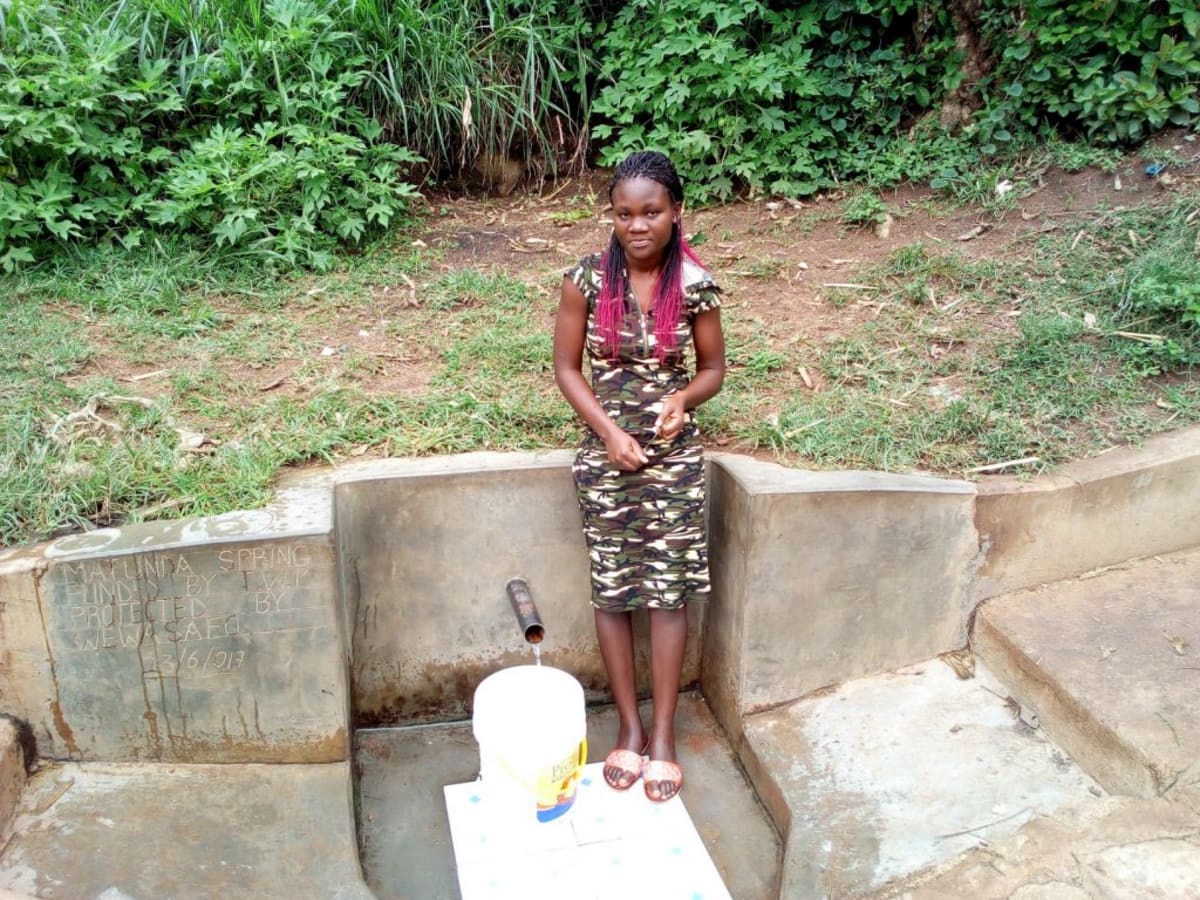This project is a part of our shared program with Western Water and Sanitation Forum (WEWASAFO). Our team is pleased to directly share the below report (edited for clarity, as needed):
Welcome to the Community
Days in Handidi Community start early in the morning at about 6am. Women go to fetch water from the spring and carry it back to prepare breakfast for their children. When they finish their domestic chores, they then go to till their pieces of land.
Men engage in activities such as "boda boda" riding business to fend for their families, which means they use their motorbikes to taxi customers for a small fee. Other men get paid for casual labor at various construction sites.
Children go to school from Monday to Friday and assist their parents with chores on the weekends. Unfortunately, most men in this community choose not to provide for their families. Instead, the money they earn during the day sates drinking habits at night. This leaves women to do everything they can to make ends meet for themselves and their children. Land is furiously tilled to yield enough crop for both the family and to sell at the local market.
Most of the people here grow crops such as maize, beans, cassava and groundnuts. They also engage in different income-generating activities such as making bricks and ballast by breaking huge rocks into smaller pieces to sell to local construction projects. The poverty here is very serious, as most adults engage in hard labor but the returns are still not enough to fend for their families' needs, not to mention school fees. Most children drop out of school early to be employed as causal labors for making bricks and ballast.
There is also an orphanage called "Victorious" that provides shelter for local children.
Water Situation
Matunda Spring is the main water source for 240 people living in Handidi Community. The spring also serves the nearby business people operating hotels and butcheries as well as an orphanage during the dry months.
The water is used for drinking, cooking and irrigating land.
The spring is unprotected and open to contamination from many different sources. Wild animals come and go, and rainwater washes dirt and waste into the water. The community has only fixed an iron pipe that allows a container to be filled more easily. Without this pipe, a small container would have to be continuously dunked in the dirty water and bailed into a larger container.
After drinking this water, there are outbreaks of waterborne diseases such as cholera, typhoid and dysentery.
Sanitation Situation
Sanitation in this community is wanting. During the baseline survey, we found out that many people do not have pit latrines of their own, and the few who do don't maintain them. Those who do not have a latrine share with their neighbors, while others practice open defecation in the bushes near their homes. Since the spring is unprotected and located downhill from these households, feces are washed into the water.
Hygiene practices are also poor amongst the community members; many people do not wash their hands after visiting latrines, their compounds are dirty, and most do not have compost pits. Garbage is thrown everywhere.
Few people had dish racks, clotheslines, and bathing shelters. Most people dry their clothes on the ground, on bushes, or on roofs.
Plans: Hygiene and Sanitation Training
Community members will attend hygiene and sanitation training for at least two days. This training will ensure participants are no longer ignorant about healthy practices and their importance. The facilitator plans to use PHAST (Participatory Hygiene and Sanitation Transformation), CLTS (Community-Led Total Sanitation), ABCD (Asset-Based Community Development), group discussions, handouts, and demonstrations at the spring.
Training will also result in the formation of a committee that will oversee operations and maintenance at the spring. They will enforce proper behavior around the spring and delegate tasks that will help preserve the site, such as building a fence and digging proper drainage.
Plans: Sanitation Platforms
On the final day of training, participants will select five families that should benefit from new latrines.
Training will also inform the community and selected families on what they need to contribute to make this project a success. They must mobilize locally available materials, such as bricks, clean sand, hardcore, and ballast. The five families must prepare by sinking a pit for the sanitation platforms to be placed over. All community members must work together to make sure that accommodations and food are always provided for the work teams.
Plans: Spring Protection
Protecting the spring will ensure that its water is safe, adequate and secure. Construction will keep surface runoff and other contaminants out of the water. By volunteering as unskilled laborers, attending trainings, and providing food and accommodation for the skilled artisan, community members confirm their investment in the sustainable management and maintenance of the project upon completion.
Fetching water is predominantly a female role, done by both women and young girls. Protecting the spring and offering training and support will therefore help empower the female members of the community by giving them more time and efforts to engage and invest in income-generating activities.
30-year-old farmer Zablon Matunda is the landowner whom the spring is named after. He was there fetching water when we arrived. "We drink this water because there is no other safe water source around. Cases of waterborne diseases has been reported, especially by young children and old people. Protecting this spring will greatly help us."

 Protected Spring
Protected Spring
 Rehabilitation Project
Rehabilitation Project










































